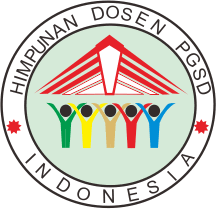Pengembangan literasi matematika pada aspek pembiasaan dan pembelajaran bagi guru sekolah dasar dikecamatan girimarto kabupaten wonogiri
Abstract
Keywords
Full Text:
PDFReferences
[Al-Tabany, Trianto Ibnu Badar. (2017). Mendesain Model Pembelajaran Inovatif, Progresif, dan Kontekstual. Yogyakarta: Kencana Prenamedia Group Daryanto. 2010. Media Pembelajaran Peranannya Sangat Penting Dalam Mencapai Tujuan Pembelajaran. Cetakan kedua. Cetakan kelima. Bandung: PT. Sarana Nurani Sejahtera Djamarah , Syaiful Bahri ., Zain, Aswan . 2010 . Strategi Belajar Mengajar. Cetakan keempat . Jakarta : Rineka Cipta. Ibnatul, Anisa. (2013 Panduan Internalisasi Pendidikan Karakter di Sekolah. Yogyakarta: UNNES Mardapi Djemari, 2012. Pengukuran Penilaian & Evaluasi Pendidikan. Yogyakarta : Nuha Medika. Nurkamilah, M., Nugraha, M. F., & Sunendar, A. (2018). Mengembangkan Literasi Matematika Siswa Sekolah Dasar melalui Pembelajaran Matematika Realistik Indonesia, 2(2), 70–79. Nurutami, A., Riyadi, R., & Subanti, S. (2019). Student’s Mathematical Literacy Ability on PISA’s Space and Shape Task. Journal of Physics: Conference Series, 1188. OECD. (2013). Education at a Glance 2013. OECD Publishing. Sintawati, M., Retnowati, E., Fitrianawati, M., & Marsigit. (2019). The Mathematical Literacy Skills of Muhammadiyah Elementary School Students in Sleman Regency, 349(Iccd), 317–321. Suprijono, Agus. 2012. Cooperative Learning Teori & Aplikasi Paikem. Cetakan Ketujuh. Yogyakarta : Pustaka Pelajar. Teguh, M. (2013). Gerakan Literasi Sekolah Dasar, 18–26. Trianto. 2010. Model Pembelajaran Terpadu Konsep, Strategi, dan Implementasinya dalam Kurikulum Tingkat Satuan Pendidikan (KTSP). Jakarta : PT Bumi Aksara. Uno, Hamzah B ., dan Masri Zainiyah, U. (2018). Literasi Matematika : Bagaimana jika Ditinjau dari Kemampuan Pemecahan Masalah Matematika Siswa SD Kelas Tinggi ?, 4(1), 5–14.
Refbacks
- There are currently no refbacks.



